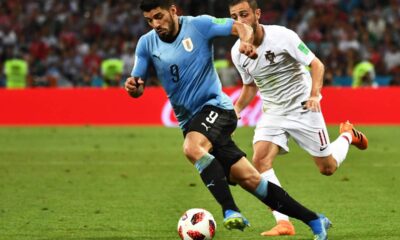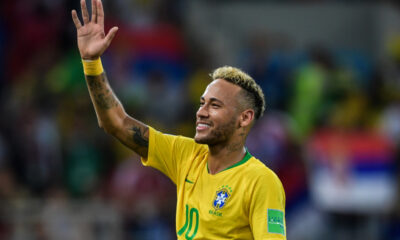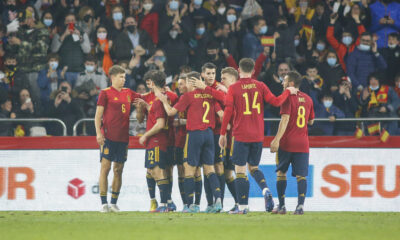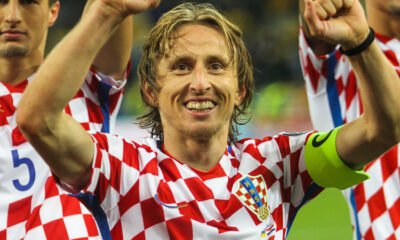Football
World Cup 2010 in South Africa: Famous vuvuzelas, troubled Jabulani, Spain king of the football world
It was probably one of the most memorable World Cups in its history. The 2010 World Cup in South Africa offered many beautiful but also dramatic moments. The Spaniards confirmed that they were rightfully on the football throne at the time, the upstart Germans took bronze. What did this World Cup have to offer?
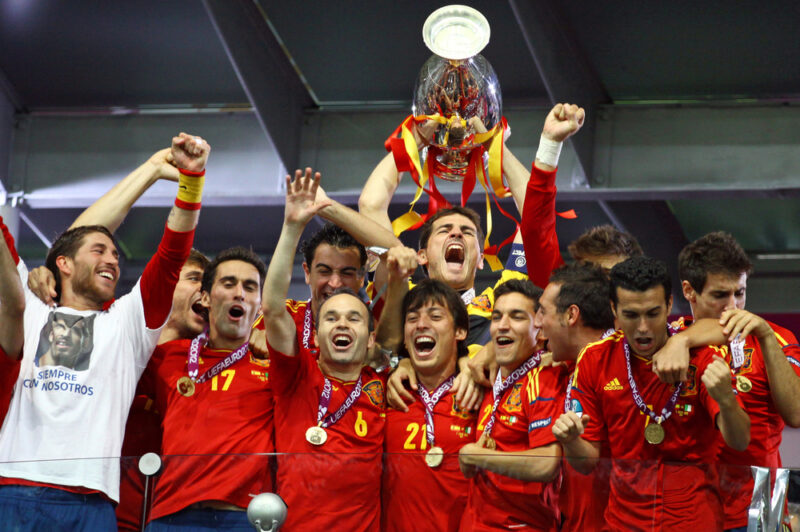
It was probably one of the most memorable World Cups in its history. The 2010 World Cup in South Africa offered many beautiful but also dramatic moments. The Spaniards confirmed that they were rightfully on the football throne at the time, the upstart Germans took bronze. What did this World Cup have to offer?
The 2010 World Cup in South Africa was the nineteenth in its history, with nine cities sharing the hosting duties – Polokwane, Durban, Pretoria, Rustenburg, Mbombela, Johannesburg, Cape Town, Port Elizabeth and Bloemfontein.
This world championship will always be remembered. Mostly hopefully in a good light, but it is true that the 2010 World Cup in South Africa was not without its controversies.
Vuvuzela, Jabulani ball
When you mention the word vuvuzela in front of a football fan, everyone will surely think of the 2010 World Cup. These, originally indigenous instruments, were the ones used by fans in the stadiums during the matches. It should be noted that the vast majority of fans were simply annoyed by the vuvuzelas, and some players protested against this method of cheering.
And not only them, according to reports at the time, the fans in front of the TV screens didn’t like this tool either. Fortunately, the sound of the vuvuzelas was eventually muted on TV, but the stadiums were often a living hell for everyone involved. The noise from these instruments can reach up to 127 decibels.
South African scientists have since claimed that vuvuzelas can actually cause permanent hearing damage. To give you an idea, they also said that a chainsaw, for example, can produce a noise of 100 decibels.
The noise from that many vuvuzelas is even louder than the average rock concert (115 decibels). And, it should be added, only three decibels louder is the sound of a jet engine. So if fans left the stadium with only a headache, it was a success.
On the other hand, vuvuzelas have become iconic instruments for the 2010 World Cup in South Africa. It’s also one of the main things fans remember when they think of this tournament. As for other controversies or interesting facts, another one is the Jabulani ball itself.
It has undoubtedly, like the aforementioned instruments, become absolutely iconic, but has been subject to much criticism. Some goalkeepers, fielders and coaches have complained about it.
The reason was that Jabulani was erratic in the air, was too fast and had a really big bounce. Even FIFA itself later admitted that there was something wrong with the official ball of the 2010 World Cup in South Africa.
Qualifiers
However, as far as the tournament itself is concerned, a total of 32 teams made it through from the qualifiers, which attracted 204 entries. Of these, 13 were European, 8 American, 6 African, 3 Asian and Australia and New Zealand, as representatives of Oceania. In terms of specific countries, South Korea, North Korea and Japan were in the tournament for Asia.
Within Africa, Côte d’Ivoire, Cameroon, Ghana, Algeria, Nigeria, and South Africa were all guaranteed to participate in the 2010 World Cup in South Africa.
America had its main favourites in Brazil and Argentina. In any case, Uruguay, Paraguay, Mexico, Chile, the USA and Honduras also took part in this championship. And as for the European representatives? This is clearly the longest list.
France, Greece, England, Slovenia, Germany, Serbia, the Netherlands, Denmark, Italy, Slovakia, Portugal, Spain and Switzerland. Unfortunately, this tournament had to do without the Czech national team, which didn’t make it through the qualifying round.
Group stage
The group stages at the 2010 World Cup in South Africa produced two shocking results. France failed to advance from the main group, having collected just one point from their three matches in Group A. And that was for a goalless draw with Uruguay.
The French national team otherwise lost to Mexico 0:2 in the other matches in this group, and in the last match they lost to South Africa (1:2). With seven points, Uruguay was promoted from first place, while Mexico secured second place with four points. The home team finished third with the same number of points.
The second big shock came from the Italians. In Group F, they faced the Slovaks, New Zealand and Paraguay and, like the French, finished last. In three games they took only two points, drawing 1-1 with Paraguay and New Zealand. Italy lost to Slovakia 2: 3.
Paraguay advanced from first place in Group F (5 points), while the Slovaks (4 points) also qualified for the next stage. The third place did not go to New Zealand with three points, thus condemning Italy to the last place with two points.
In addition to the aforementioned teams, Argentina, South Korea, USA, England, Germany, Ghana, Netherlands, Japan, Brazil, Portugal, Spain and Chile have also reached the eight finals of this championship.
Knockout battles
The eighth and quarter-finals of the 2010 World Cup in South Africa produced some great matches and dramatic moments. For example, the duel between the USA and Ghana, which went into extra time, was very interesting. And the players of the latter team were more successful.
However, Uruguay defeated South Korea 2:1, Argentina defeated Mexico 3:1, and the Dutch ended Slovakia’s participation in this tournament by winning 2:1. In the set time of the second half Robert Vittek only corrected the score of the match.
The upstart Germans overcame England 4:1 in the semi-finals, while the favoured Brazil beat Chile 3:0. The match between Spain and Portugal was dramatic. In the end, however, David Villa decided the Spanish progress in the 63rd minute.
On the other hand, the contest between Paraguay and Japan was fought in a combative spirit. Both after regulation time and after extra time, the match was even and, above all, scoreless. The match went to a penalty shootout, in which the Paraguayans were more successful.
The quarter-final also featured penalty kicks, with Uruguay and Ghana playing each other. Notably, the South American country was dragged through this tournament by Diego Forlán with Luis Suárez and Edinson Cavani. However, it was Forlán who shone the brightest in terms of play.
After extra time, the score was 1-1, but it was the Uruguayans who won 4-2 on penalties. The great Netherlands managed to knock out Brazil 2-1 in the quarter-finals. Wesley Sneijder scored twice and Robinho put the Brazilians ahead in the 10th minute.
The Germans blasted Argentina 4:0, while Villa’s goal in the 83rd minute helped the Spaniards reach the semi-finals. Paraguay were sent home.
Spain golden, Uruguay sad
The 2010 World Cup in South Africa featured several strong and excellent teams. But only one could win. The semi-final pitted Uruguay and the Netherlands against each other, while the other semi-final match was a duel between Germany and Spain.
It must be added, both matches were really worth it in terms of attractiveness. Giovanni van Bronckhorst sent the Dutch into the lead in the 18th minute, but Forlán equalised in the 41st. But in the second half, Sneijder and Arjen Robben took the lead for the Netherlands. Maxi Pereira struck for Uruguay in injury time, but there was no time for an equalising goal.
Spain were the other qualifiers for the final after a hard-fought 1-0 win over Germany. In the 73rd minute, the heartthrob and one of the best stoppers in the world at the time, Carles Puyol, scored the winner.
Germany and Uruguay fought it out for bronze, with the Germans taking the bronze. Thomas Müller, Marcell Jansen and Sami Khedira secured the win, but unfortunately Cavani and Forlán’s goals were not enough for Uruguay.
The final was also an amazing battle. The match went into extra time as the score was 0:0 after regulation time. In the 116th minute, Andrés Iniesta came through anyway and shot the Spaniards to gold.
The Spanish continued their spectacular footballing journey and confirmed their title not only as kings of Europe, but of the world. If you are interested in the details of this tournament, don’t hesitate to visit our special above.
Speaking of numbers…
A total of 64 matches were played at this World Championship, in which 145 goals were scored. On average, that’s 2.27 goals per game. In terms of attendance, 3 178 856 spectators came to South Africa (almost 50 000 per game).
The 2010 World Cup in South Africa will be one to remember thanks to all of the above. Sportingly, it was a great championship.
However, once again, I must remind you that if you want to know not only the detailed course of the tournament, but also Mr. Hraběte’s exclusive insights, do not hesitate to visit our special attached above.
FIFA, ESPN

